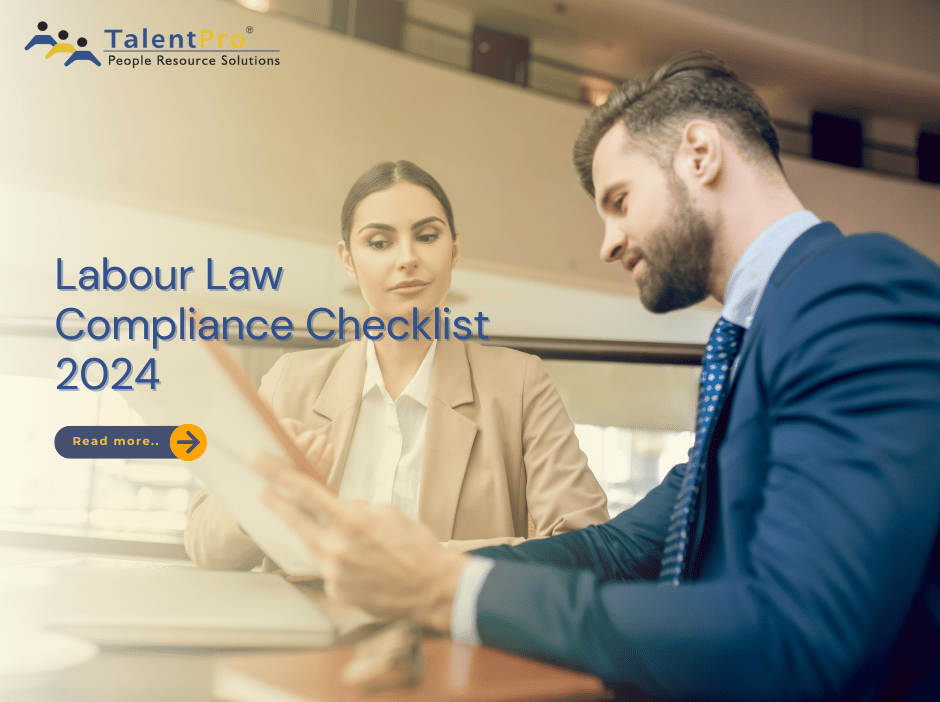The Labour Law Compliance Checklist is designed to be a short, practical guide on how to comply with the law. It can be used by individuals and organizations alike, whether they are small businesses or large multinational companies.
The checklist is divided into three sections:
- Section 1 – General Information about your business and employees;
- Section 2 – Application for Contractor Status or Employment Permit;
- Section 3 – Employment Standards Act (ESA), (Hours Worked) & Wage Rate Requirements for Contractors & Self-Employed Persons;
A labour law compliance checklist typically includes a list of items that an organization should review to cover some of the most common items:
- Employment contracts: Ensure that all employees have a written employment contract that complies with labour laws in your jurisdiction.
- Minimum wage: Ensure that you are paying all employees at least the minimum wage required by law.
- Overtime: Ensure that you are paying overtime to eligible employees who work more than the maximum hours allowed by law.
- Workplace safety: Ensure that your workplace is safe and free from hazards. This may include providing protective equipment, implementing safety procedures, and providing training to employees.
- Discrimination: Ensure that you are not discriminating against employees based on their race, gender, age, religion, or other protected characteristics.
- Harassment: Ensure that you have policies in place to prevent and address harassment and that all employees are aware of these policies.
- Family and Medical Leave: Ensure that you are complying with all family and medical leave laws, including providing eligible employees with time off for qualified reasons.
- Payroll taxes: Ensure that you are withholding and paying all required payroll taxes, including state and local taxes.
- Record-keeping: Ensure that you are maintaining all required records, including payroll records, employment contracts, and employee files.
- Worker classification: Ensure that all workers are properly classified as employees or independent contractors according to labour laws in your jurisdiction.
It is important to note that labour laws can vary depending on your location, so it’s always a good idea to consult with a legal professional to ensure that your organization is in compliance with all applicable laws and regulations.
The compliance checklist serves as a quick, helpful manual on following the law.
Statutory Compliance Checklist for 2024
It is every organization’s first and foremost responsibility to keep tabs on the above statutory compliance checklist. Some of the basic set of rules and laws that require equal consideration are as follows:
Minimum Wages: The minimum wage act, as mentioned above, speaks up for the minimum amount of money that any worker deserves to ensure that the optimal requirements of the former. This wages act takes the best possible care of money and also provides adequate medical help, education, and other relief to the person.
Tax Deducted at Source – TDS: Every employer deducts the TDS of employees as legally directed via guidelines of the act. Although a lot of employees don’t come under the tax bracket, as the organization’s key responsibility, HR ought to deduct TDS wherever applicable.
Employee State Insurance and Provident Fund: Any employee is expected to pay ESIC deduction on a monthly basis. The HR department, on the other hand, deducts this amount and pays it to the ESIC so that the employees are able to access health benefits.
Gratuity: If any employee completes 5 years of work anniversary in a particular organization, the company extends gratuity in return. The gratuity amount should be paid by the employer for which the employer normally creates provisions out of its own cost.
Read more:(Payroll checklist for 2024)
The checklist is split into four sections:
- legal requirements;
- employment relations;
- Employee privacy and data protection;
- employment status and
- rights of employees (including parental leave).
There are a few other laws that also require the preparation of the Labor law compliance checklist.
These are mainly:
- Shops and commercial Establishment Act
- The Professional Tax Act
- The Labor Welfare Fund Act
- The Minimum Wages Act, 1948
- The Payment of Bonus Act, 1965
- The Payment of Gratuity Act, 1972
- The Equal Remuneration Act, 1976
A calendar type of checklist is required to ensure proper compliance.
For Example,
- TDS must be deducted and deposited by the 7th of every month followed by form ITNS281.
- As for the Factories Act, returns must be filed by the 15th of every month, and EPF must be deposited by the 21st of every month.
- ESI deductions and forms must be done by the 21st of the following month.
- Quarterly Income Tax returns in form 24Q and form 27 need to be filled by 31st of applicable month or the quarter.
However, it should also be noted that it is not an easy task to keep track of all the necessary compliances, as certain acts and laws are applicable only in certain conditions, such as the number of employees or in certain pay limits.
Read more:(What Makes TalentPro Your Best HR Business Partner?)
HR staff must ensure that their checklist reflects the latest amendments and incorporate such changes in their filing and returns. There are specific dates on which deposits should be made and forms filed with the appropriate authorities. There must be monthly returns, quarterly returns or annual returns that need to be filed in time according to various acts and rules. Errors may result in penalties. One of the easiest and best ways is to outsource compliance with experts or use the right HR Service provider. Not all laws apply to all businesses. The HR should be aware, which rules apply to which company to prepare a calendar of the checklist and follow them rigorously for full compliance.









